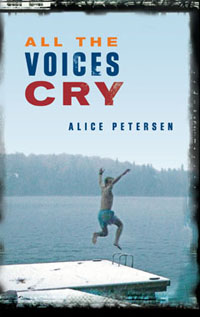Reviews
Fiction Review by Norma Lundberg
Alice Petersen, All the Voices Cry (Emeryville: Biblioasis, 2012). Paperbound, 160 pp., $19.95.
Loss, being lost, and coping with lost loved ones are the motifs in this first collection of stories by Alice Petersen, a New Zealander now living in Canada. The stories appeal for their pervasive element of place and the ways in which each character tries to connect with the landscape they inhabit. In “After Summer,” children lose their closeness with their father when he moves in with a new woman. An aging woman loses her artist lover to a young man and then to death in “Among the Trees.” The artist has created ephemeral work in the woods from natural objects, delighted that his work would be lost and not collectible, unwilling even to have it photographed by a woman whose subjects are transient and prone to vanishing: “clouds, trees, reflections….” A misguided traveller in “Champlain’s Astrolabe” loses track of his wallet and car keys, and nearly his life. The author portrays her characters with compassion and humour, not as “losers” but as searchers confronting and undone by their human vulnerability.
While some of the stories are situated in New Zealand or Tahiti, many are set near Lac Perdu—“lost lake”—with its log cabins “on the edge of a great forest of the Mauricie” in a remote area of Quebec. A woman with a passion for photography converts her inherited fishing lodge there into an artists’ colony as a retreat from the urban density of Montreal and Toronto. She and some of the people who regularly visit the colony are referred to in other stories in this collection, as is Lac Perdu itself, creating a thread of connection beyond the region to other places where nature appears as a possible refuge. The photographer reappears in “Salsa Madre,” a story about a woman making a sacred object out of a discarded bathtub in Montreal, and yet again as a mystery to the man in “Champlain’s Astrolabe” sent to meet her. The art colony, later abandoned, is known to a woman who has lived much of her life in the area and whose new lover is friends with some of the colony’s visitors.
These connections are sensed by the reader though seldom by the characters and effectively haunt the various landscapes. They create a loose community of people who encounter disappointment in their expectations and turn their attention outward to the natural world to restore their spirits. While some have minor epiphanies, they are mostly unable to feel saved by their brief experience of wild places. In “Through the Gates,” a distraught New Zealand mother seeks consolation for a distant daughter’s illness on a trip to the mountains to look for a glacier described by stories as frozen tears. Her helplessness and confusion overwhelm her—”I feel like it’s all speaking”—though she doesn’t understand the message. Nature as a cure for human distress proves here, as elsewhere in these stories, to be merely temporary, since human voices continue to dominate and fail to offer comfort.
Petersen’s characters talk more to themselves than with others, and many of them suffer from the awkwardness of human connections. They either question or try to justify the impasses of their lives while the natural world they encounter is virtually silent for them, incomprehensible. Their connection to it is further restricted by their inability to articulate their response to it. The description of submerged vegetation, the suck and pull of marsh life in “The Frog,” offers a striking exception. A single mother feeling stuck in the routine of her life goes on a hike with her son and her sister on a woodland trail. She tires of their conversation and sets off on her own splashing among water plants and frogs. The word that moves her closer to the wilderness is amphibian but she can’t get beyond it being a metaphor for her human dilemma. She overcomes her temptation to disappear in the wild and returns to her old life. Some voices utter affliction. In “Where the Corpse Weed Grows,” a young woman searches in the woods for a herb to add to a mixture she hopes might cure her dying mother. A wilderness guide shows her a plant she has never before seen, its common name unlocking her true feelings toward her mother and a desire to crush the plant. A mother on a car trip with an overbearing husband and loud children revisits a childhood memory of cottage summers, her reverie interrupted and belittled by her family, whose “words fell like light blows.” The wife in “Neither Up nor Down” finds herself “submitting to the roar” of her husband’s insensitive verbal posturing. She rebels and briefly tries to lose him in the tropical forest, then repents and rescues him.
In all the stories, nature remains primarily a backdrop to human problems and never fully comes alive for them or even finally for the reader. In the title story, a woman on a winter trek loses her way though the forest near Lac Perdu and plods through dense snow imagining conversations with her dead husband and father. The sudden calls of crows mingle with her internal voices until all the voices cry out a warning to remind her that she is truly alone and at risk. Ultimately these stories show us people who suffer their solitude unable to connect with the wildness either outside or inside.
—Norma Lundberg









